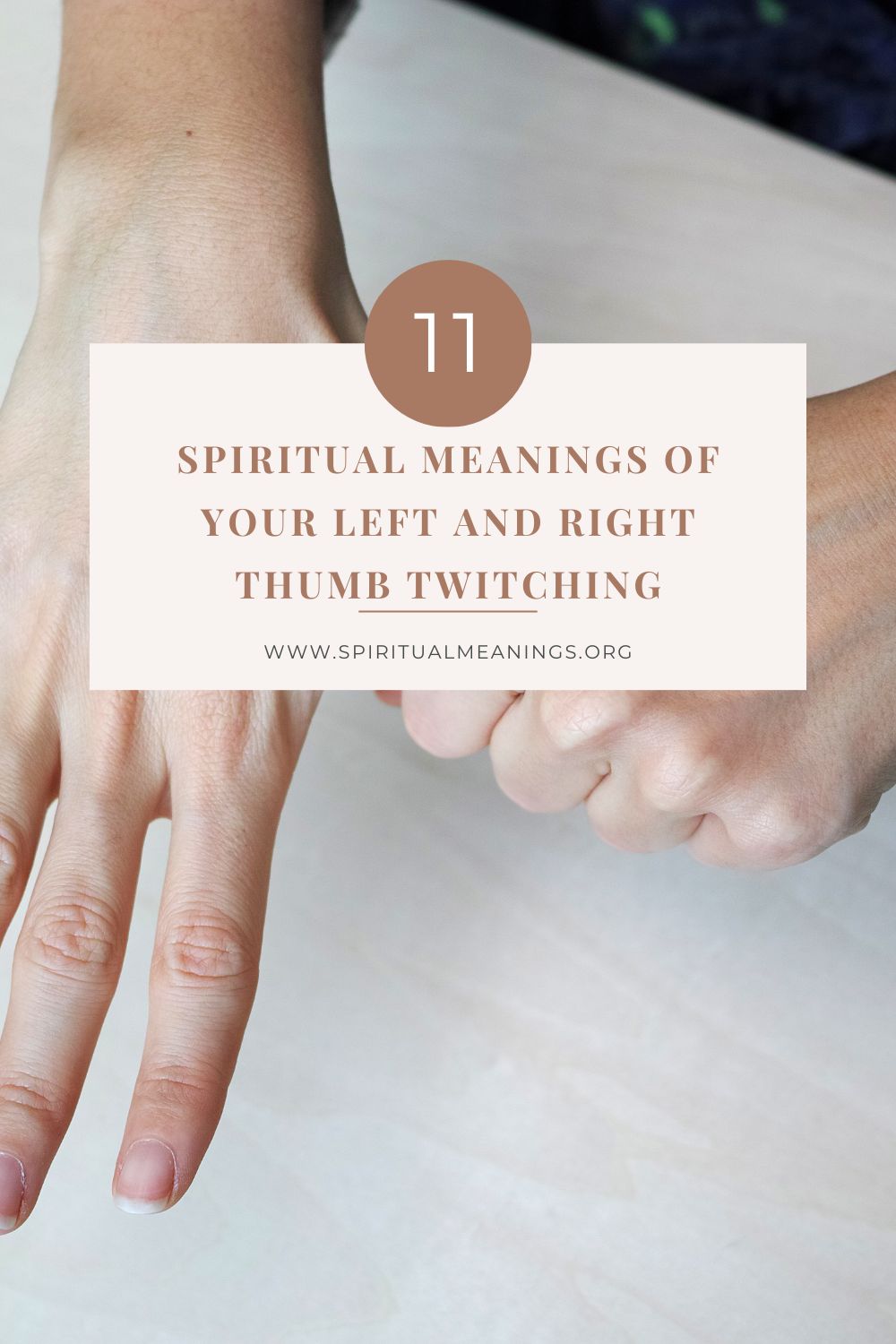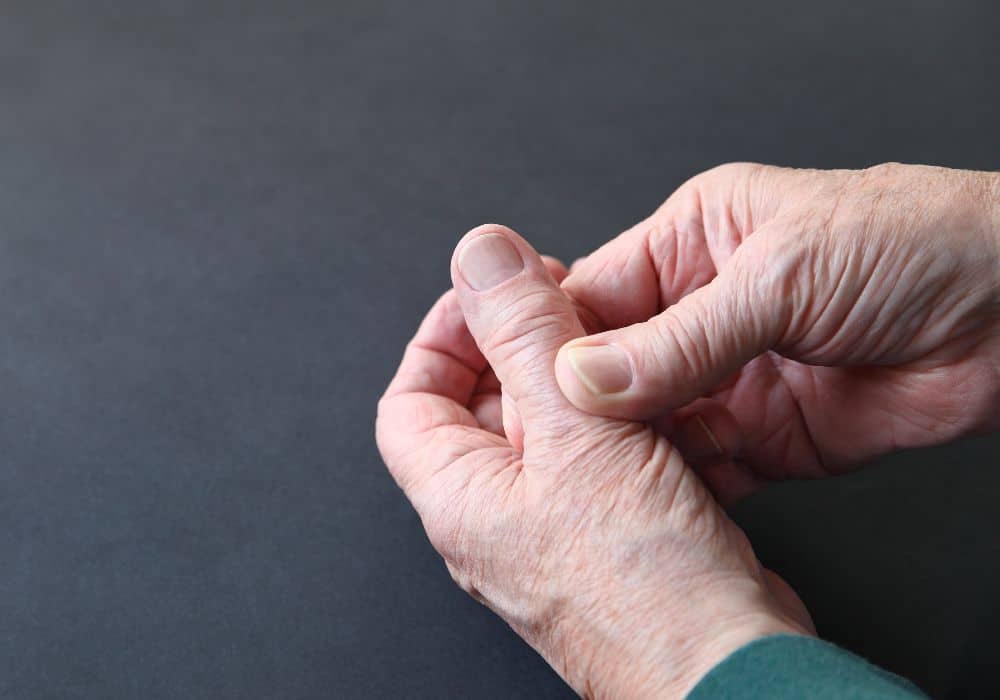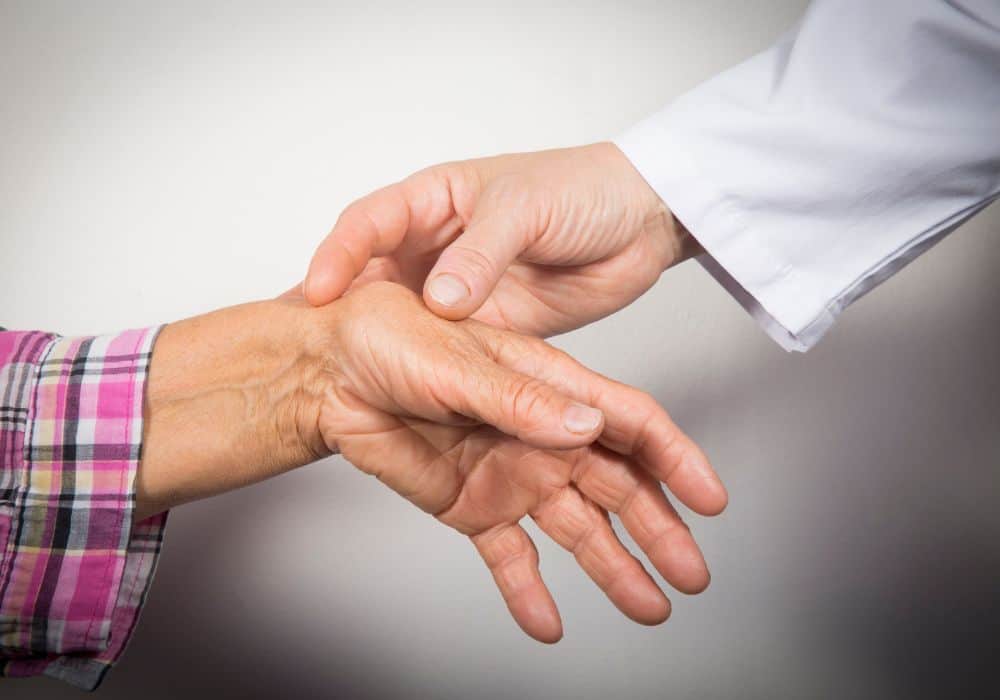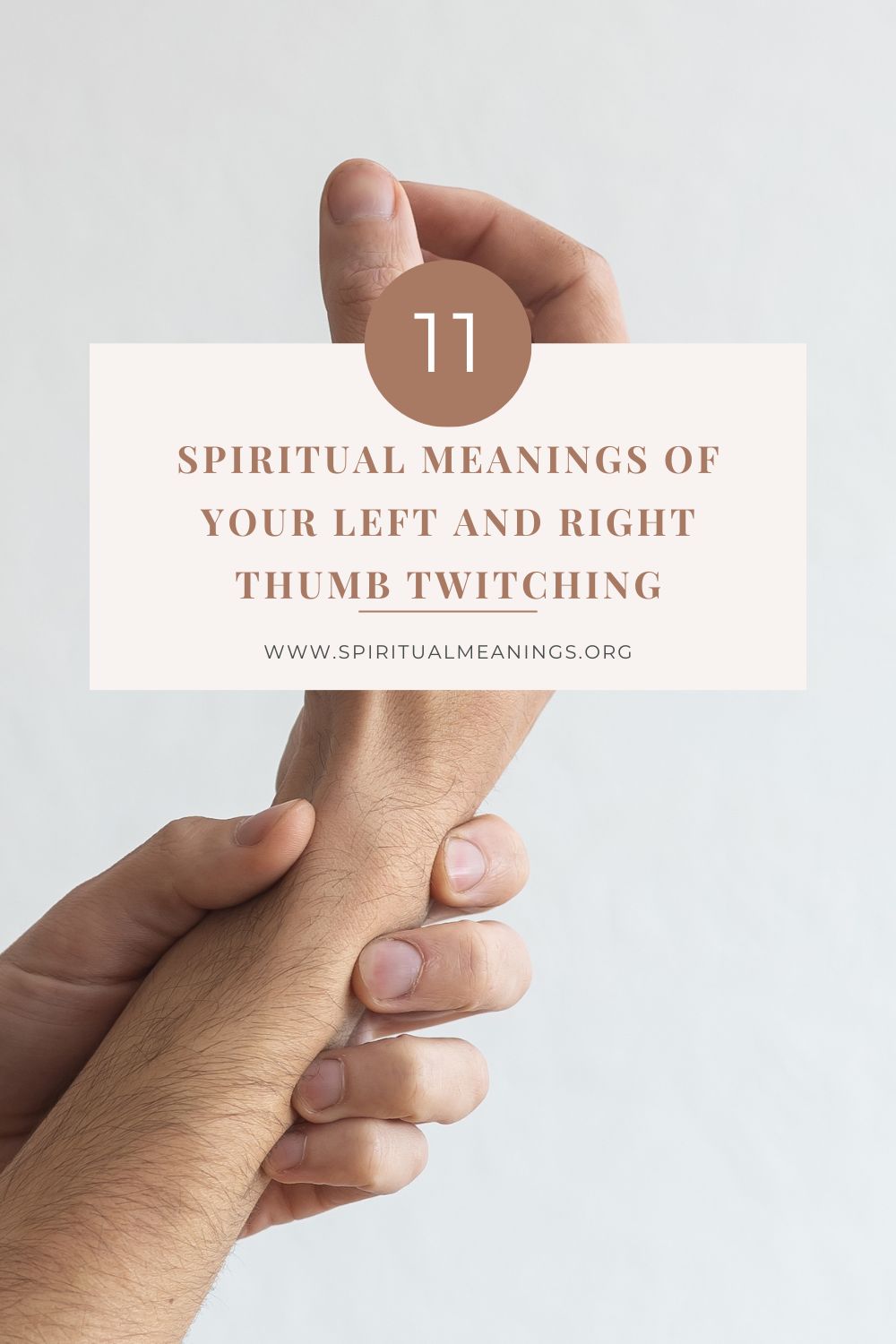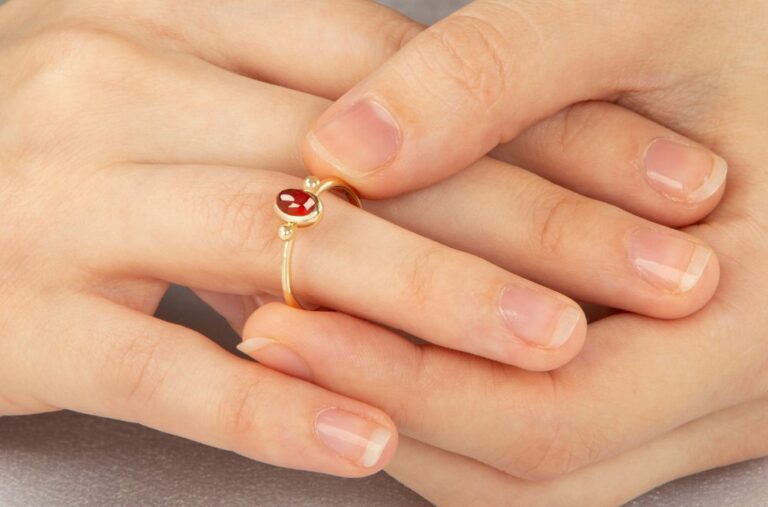Muscle twitching, also known as a fasciculation, is the involuntary movement of fine muscle fibers. These muscle contractions and relaxations can occur throughout the human body and are mostly harmless. However, they can sometimes be related to serious conditions.
If your left or right thumb twitches, it is most likely innocuous, and you shouldn’t really worry about it. But, if the muscle twitching is persistent, you should ideally visit a doctor. So, what does it mean when your left and right thumb twitches? Is there another explanation besides the medical one for it?
In this article, we’ll explore the physiological and spiritual meaning behind muscle twitching in your thumbs, as well as what you should do about it. Keep on reading to learn more about the spiritual meanings of thumb twitching!
Spiritual Meanings Of Your Left and Right Thumb Twitching
If you just noticed your left and right thumb twitching, it is understandable to feel worried that something is wrong with your body. In most circumstances, this unexpected twitch occurs a few times due to small causes in our everyday lives.
But, if the muscle twitch happens for days or weeks and is accompanied by other symptoms, it could be related to neurological conditions. Here are some of the most popular physiological reasons why your left and right thumb twitch:
1. Stress & Anxiety
Stress is one of the primary factors for any neurological disorder since our daily lives have become so stressful. If you have a lot of stress or worries, it’s normal for your nervous system to react abnormally. After all, stress heavily affects the brain, which, in turn, affects our nervous system.
If you are having a particularly stressful day or week, you could notice twitching in some parts of your body, including your thumbs, feet, or eyelids. While this should not worry you as much, you should consult with a doctor if it does not go away.
If you suffer from anxiety, a long-term form of stress, you are probably used to being stressed about even the most minor things in life. You probably have experienced a lot of muscle twitching and are accustomed to it. However, you should always look to maintain your mental health to avoid any mental health issues.
2. Caffeine
Most people simply love coffee! They can’t start their day without one and usually consume a few throughout the same day. Caffeine is a very effective stimulant that helps keep you energized and productive.
Besides coffee and tea, energy drinks also have large amounts of caffeine and other stimulants to keep you running all day. However, if you have several, it is considered an overdose of caffeine, leading to several neurological issues and conditions.
3. Drugs
All types of medication have side effects. One of these side effects could be involuntary muscle contractions like thumb twitching. If you are taking a particular medicine for a condition you have, check its side effects to see if it lists muscle twitching.
Some popular over-the-counter medications that have these side effects are corticosteroids and diuretics. Drugs like amphetamines or cocaine can also cause involuntary muscle spasms because they are strong stimulants.
4. Sleep Deprivation
Many of us have had several sleepless nights trying to finish a paper for college or a project for work. Some people’s workload does not always allow them to have a good night’s sleep. Others face chronic conditions, such as insomnia, that do not allow them to sleep at all during the night.
Sleep deprivation is a very important concern that many people have and can lead to many other issues. During sleep, our body takes time to regenerate and replenish dead cells, as well as remove any toxins that have accumulated over the previous day.
An improper sleep means that these processes are not fully carried out, which leads to issues throughout the body. Some of the most common ones are related to the brain, such as muscle twitching in your thumbs or toes.
5. Dietary Reasons
Our diet is one of the most overlooked parts of the health of our body. People often look for medication to deal with issues they have when a few minor changes to their diet could be the solution to their problems.
One of the most common reasons for twitching muscles is a lack of certain nutrients like magnesium, vitamin D, and calcium. If you want to build strong muscles and avoid spasms, consume more foods rich in these nutrients.
Another very important part of our diet is proper hydration. People often do not drink enough water during the day, which leads to dehydration. This can cause several dysfunctions in our body, including muscle cramps and spasms.
6. Intense Exercise
Muscle contractions are often present after intense workout sessions. If you do a particular type of exercise that includes your hands, like weightlifting, then it is normal for your hands and fingers to be sore and twitchy after a while.
Also, your hand muscles may be more prone to cramping if you just started a new exercise routine. Take some time to stretch them properly and add an extra rest day to avoid muscle spasms.
7. Repetitive Movement
People who use computers for many hours during the day are prone to repetitive movements such as typing on a keyboard or mouse clicking. These repetitive movements can cause fatigue to the muscles and joints, and nerves of your fingers.
This can cause severe thumb twitching and even lead to more severe conditions like carpal tunnel syndrome. If you use your computer a lot, you should take frequent breaks and ensure that your workspace is ergonomically set up for you.
Another type of repetitive movement that doesn’t often come to mind, but almost everyone does, is using a smartphone. Most people scroll through social media for several hours every day, which can cause your left or right thumb to twitch.
8. Benign Fasciculation Syndrome (BFS)
Benign Fasciculation Syndrome (BFS) is one of the most common medical conditions that describe people with muscle twitching. It can occur in several body parts like the eyelids, fingers, and toes. As the name suggests, it is not detrimental to your health but can be harmful if left unattended.
Other symptoms accompanying BFS include numbness, weakness, cramps, and muscle stiffness. This muscle stiffness can sometimes be categorized as Cramp Fasciculation Syndrome (CFS).
9. Autoimmune Diseases
Autoimmune disorders are very dangerous and can happen to anyone, regardless of health or age, at any point in their lives. While some of them are treatable, most of them cannot be fully cured.
Autoimmune conditions can have several different symptoms depending on the person and the condition. Some autoimmune diseases include muscle spasms and twitching like myositis, Stiff Person Syndrome (SPS), and Isaacs’ Syndrome.
10. Conditions Of The Central Nervous System (CNS)
Since involuntary muscle twitching is a neurological issue, it’s a natural occurrence in several conditions of the Central Nervous System (CNS). The most common one is Parkinson’s disease. This condition involves involuntary tremors throughout the body, beginning in the fingers and hands.
Another widespread disease that heavily affects muscles is amyotrophic lateral sclerosis (ALS). In this condition, brain and spinal cord motor neurons gradually weaken and die. This means that information from the brain can’t be transmitted to the muscles, which leads to movement inability.
Apart from physiological factors, there are also several superstitions and spiritual meanings behind your left or right thumb twitching:
11. Spiritual Meaning Of Your Left And Right Thumb Twitching
In general, if your right or left thumb twitches, it’s usually a sign from the divine that your prayers have been heard. Your thumbs will also twitch if you are about to receive a message from the spiritual world.
If your right thumb twitches, it is usually a sign of good health. This works if your lifestyle is healthy and if your body needs some healing. Maybe you have had some health problems recently and have asked for spiritual help. The twitch of your right thumb indicates that your body will begin the healing process.
If your left thumb twitches, it can have a couple of meanings. The most common one is that you will soon meet a very important individual. This could be someone who is a prominent figure or just a person that will change your life. Another sign of your left thumb twitching is that untrustworthy people surround you, and you should proceed through life with caution.
Conclusion
All in all, muscle spasms in your right hand or left hand can be harmless, but you should monitor them in case they persist. The most common reason for this type of tremor is a mineral deficiency like calcium or potassium.
Make sure to be adequately hydrated and take some electrolytes to boost your mineral intake. Also, do not consume as much caffeine and maintain a healthy diet with supplements for any nutrients it lacks.

